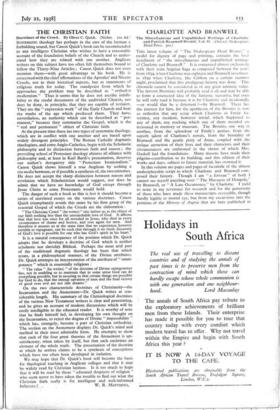THE CHRISTIAN FAITH
Dpetrines of the Creed. By Oliver C. Quick. (Nisbet. los. 6d.)
SYSTEMATIC theology has perhaps in the ears of the layman a forbidding sound, but Canon Quick's book can be recommended to any intelligent Christian who wishes to have a reasonable account of the foundation beliefs of the Church and to under- stand how they are related with one another. Anglican writers on this subject have too often felt themselves bound to follow the Thirty-Nine Articles ; Canon Quick does not even mention them—with great advantage to his book. He is
concerned with the chief affirmations of the Apostles' and Nicene Creeds, not in their historical aspects, but as statements of religious truth for today. The standpoint from which he approaches the problem may be described as " orthodox modernism." Thus it seems that he does not ascribe infalli- bility to the credal documents of the undivided Church, nor does he deny, in principle, that they are capable of revision.
They are the " expression work " of the Early Church and bear the marks of the age which produced them. They have, nevertheless, an authority which can be described as " per- manent," because they summarise the Gospel, which is the " real and permanent " object of Christian faith.
At the present time there are two types of systematic theology, which are in conflict with one another and are based upon widely divergent principles. The Roman Catholic dogmatic theologians, and some Anglo-Catholics, begin with the Scholastic philosophy and its distinction between faith and reason ; the prevailing school of Protestant theology abjures all alliance with philosophy and, at least in Karl Barth's presentation, deserves our author's derogatory title " Protestant Irrationalism." Canon Quick shows himself a true Anglican by seeking a
via media between, or if possible a synthesis of, the two extremes. He does not accept the sharp distinction between reason and revelation which Scholasticism would suggest, nor does he admit that we have no knowledge of God except through
Jesus Christ as some Protestants would hold.
The danger of such a book as this is lest it should become a series of unrelated essays on the various doctrines. Canon Quick triumphantly avoids this snare by his firm grasp of the essential Gospel of which the Creeds are the elaboration :
"The Christian Creed " (he writes)" sets before us as the object of our faith nothing less than the unsearchable love of God. It affirms that that love was once for all revealed in Jesus, who died in every crcumstance of shame and horror, and rose again for men. And therefore it assures us at the same time that no experience, however terrible or repugnant, can be such that through it no fresh discovery of God's love is possible for one who has God's spirit in his heart."
It is a natural consequence of the position which Dr. Quick adopts that he develops a doctrine of God which is neither
scholastic nor slavishly Biblical. Perhaps the most arid part of the traditional dogmatic theology has been that which treats, in a philosophical manner, of the Divine attributes.
Dr. Quick attempts an interpretation of the attribute of " omni- potence " which is essentially religious : " The value " (he writes) " of the doctrine of Divine omnipotence • lies, not in enabling us to maintain that in some sense God can do everything possible, but in assuring us that certain things are possible for God to do,- that the eternal salvation of men and the final victory of good over evil are not idle dreams."
On the two characteristic doctrines of Christianity—the Incarnation and the Atonement—Dr. Quick writes at con-
siderable length. His summary of the Christological doctrines Of the various New Testament writers is clear and penetrating, and he gives an account of modem discussions which will be easily intelligible to the educated reader. It is worthy of note that he finds himself led, in developing his own thought on the Incarnation, to reject the dogma of Divine " impassibility" which has, strangely, become a part of Christian orthodoxy. The section on the Atonement displays Dr. Quick's mind and method in their most admirable form. He attempts to show, that each of the four great theories of the Atonement is un- satisfactory, when taken by itself, but that each enshrines an element of the whole truth. The presentation of the doctrine at which he arrives claims to be a synthesis of conceptions which have too often been developed in isolation. We may hope that Dr. Quick's book will become the basis for theological teaching in Anglican colleges and that it may
be widely read by Christian laymen. Is it too much to hope That it will be read by those " educated despisers of religion " who seem never to have taken the trouble to find out what the Christian faith really, is for intelligent and well-informed











































 Previous page
Previous page